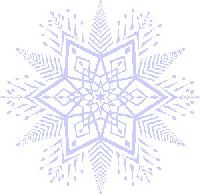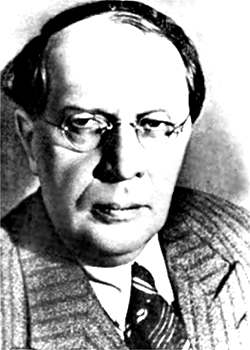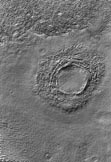presents a summary of:

|
AZURE CITIESby Aleksei N. Tolstoy(1925) |

|
| "Before the investigator there unfolded a passionate story of a tormenting, impatient, and feverish imagination." |
After demobilization, Vassili returns to the school of architecture in Moscow and studies feverishly. In April of 1924 he suffers a nervous breakdown. He receives a letter from his home in the Smolensk province. The letter is from Nadya, his mother's 22-year-old ward. Nadya and Vassili's mother have only just found out that he is still alive and in Moscow. Nadya writes that life is hard and that he should send them seeds. Also, his mother is ill and may not last long.
Vassili is very much excited by this letter. His friends raise money so he can take a trip home. Before his departure there is a party, at which Vassili tells this story:
|
"The terraces of the houses, recessed and with mirrorlike windows, were covered with plants and flowers. There were no chimneys, no wires above the roofs, no tramcar posts, no kiosks, no vehicles on the broad streets flanked with rich green lawns. The entire nervous system of the city had been buried underground. The used air of the houses was carried by ventilators into subterranean cleansing chambers. Beneath the ground, electric trains rushed with crazy speed, carrying the population of the city at stated hours to faraway factories, business concerns, schools, universities. In the city there were only theaters, circuses, halls for winter sports, stores and clubs--tremendous buildings under glass domes." |
Vassili says this city of the future is what they were fighting for in 1918. It is what he dreamed of when delirious with typhus.
His friends tell him he's feverish and that to build a new life is not to write poetry. They advise he forget his utopian socialism and stick to hard work, as if everyday were Monday. "It's harder to make something of these Mondays than to build your city."
He returns to his dirty, busy, and crumbling provincial home town. He goes to his home where Nadya is just leaving for work. He drinks tea and thinks how beautiful Nadya is and how much work will be needed to raise an azure city over this squalor.
Vassili settles into a routine in the house, waiting eagerly every evening for Nadya's return from work. The household lives on Nadya's insignificant wages. She hopes that Vassili will soon get well and find a job so as to help them. In the evenings Nadya usually goes to a friend's or to the movies, invited by some unnamed man. Vassili tries to talk to her about his work, the great plan to rebuild Moscow. She listens politely, but without great interest. He asks if she loves someone. Nadya says that people marry for love only in the movies. In real life, a woman marries if she finds someone with whom she can improve her condition. Her office manager Utyovkin asked her to get married, but she refused because he is unreliable. Vassili rhapsodizes poetically about building, struggling, love.
Rumors start to spread that Vassili is in town to marry Nadya. One day he meets a Sashok, the son of a local grain merchant. Sashok takes him to the beer hall and asks him about life in Moscow, why he's in town and for how long. Vassili himself doesn't know how long he'll stay. Sashok say he is getting ready to go to England on his father's business and asked Nadya to go along as his companion. She refused, afraid of what people would think. Sashok points out Utyovkin, who is also in the bar, flirting with the barmaid.
Depressed, Vassili sits in the park thinking of sadness, poverty, and greyness. Sashok, Utyovkin, and the barmaid have all found their place in it. Can the great new city ever rise up here?
| "There is more manhood in selling doughnuts than in rushing with naked blade into the attack." |
Vassili's health improves. He fears he is a parasite in the house. He sets to work to get ready for school again, undertaking architectural drawings. He decides that he must show Nadya his plans for his Azure City of the future; so he starts drawing it on a piece of canvas.
One evening, Vassili returns home to find Nadya crying. "Don't you see that you're compromising me?", she shouts. Rumors about Nadya and Vassili "the bridegroom" are wild in town. Utyovkin is acting like a scoundrel and hardly notices Nadya.
The next night Nadya doesn't speak to Vassili and, after dinner, hurries over to the home of a friend, Zoya Vassili follows and spies on them. Nadya talks of Vassili, calling him a "disappointment" and "that innocent". She notes derisively that he is in love with her. Zoya mocks Nadya's intention to wait until marriage to give herself to a man. She reminds Nadya that Sashok can't marry because his father won't let him. Sashok shows up with a guitar. They sing, chat, and drink tea. Vassili, depressed and insulted, slowly walks home.
Time passes. Vassili continues his preparations for school as well as his work on the Azure City, which Nadya regards indifferently. One morning, Nadya finds a vulgar word written in tar on the front gate. She screeches and locks herself up in her room. She won't talk to Vassili, whom she blames for this dishonor. She calls him a parasite and an innocent.
Rage grows in Vassili. Assuming that Utyovkin was responsible for the vandalism, he goes to the beer hall and raises a ruckus looking for him. Not finding Utyovkin, Vassili sits on a mound in the meadows. He stays there all night.
The next night, Sashok finds Nadya in Zoya's garden and begins to seduce her. Utyovkin sneaks up and spies on them. Seeing Sashok, Utyovkin says to himself, "How foolish. It was Sashok." Nadya hears Utyovkin, shrieks, and runs home, with Sashok following. Just then, Vassili comes up to Utyovkin and hits him in the head with a stone, killing him.
Nadya locks herself up in her bedroom, but Sashok jiggles the lock and gets in. He sits on the bed with her, continuing his seduction. Then Vassili, with bloody hands, enters. Sashok knocks over Vassili and runs away. Vassili thinks, "Defiler!" He picks up an iron and chases after Sashok. Sashok twists the iron out of Vassili's hand and gives him a few powerful punches.
Sashok walks away, but Vassili pulls himself and follows to the town square, which is being prepared for a big market day tomorrow. Sashok, outside the beer hall, tells everyone that Vassili killed Utyovkin. They catch sight of Vassili and chase him. Vassili hides in some hay wagons, then sets them on fire.
As the market place and then the whole town catches fire, the panicked people forget about Vassili. He makes his way to his home, which is also on fire. He rips the plan of the Azure City off the wall and returns to the town square. There, he climbs up a telegraph pole, intending to post the Azure City drawing up high for all to see. He falls and knocks himself out, which probably saved his life because otherwise the crowd would have killed him. He is arrested and appears before the court.
 Tolstoy, Aleksei Nikolaevich. Born 10 January 1882 (29 December 1882, Old Style), in the town of Nikolayevsk in the Sarmara guberniya. He was distantly related to Lev Tolstoy on his father's side, but he never stayed in the Tolstoy clan. While pregnant with the future writer, his mother, Aleksandra Leontevna nee Turgenev, left his father and ran off with another Samara landowner, A.A. Bostrom, whom Tolstoy remembered as an atheist and materialist. Aleksandra Leontevena herself was a writer, responsible for the novel Irrepressible Heart, the tale In The Backwaters, and several children's stories. At her urging, Aleksei, at age 10, wrote his first story, a tale of a young boy named Stepka. Nothing remains of this story save for one phrase: "The snow in the moonlight shone like diamonds."
Tolstoy, Aleksei Nikolaevich. Born 10 January 1882 (29 December 1882, Old Style), in the town of Nikolayevsk in the Sarmara guberniya. He was distantly related to Lev Tolstoy on his father's side, but he never stayed in the Tolstoy clan. While pregnant with the future writer, his mother, Aleksandra Leontevna nee Turgenev, left his father and ran off with another Samara landowner, A.A. Bostrom, whom Tolstoy remembered as an atheist and materialist. Aleksandra Leontevena herself was a writer, responsible for the novel Irrepressible Heart, the tale In The Backwaters, and several children's stories. At her urging, Aleksei, at age 10, wrote his first story, a tale of a young boy named Stepka. Nothing remains of this story save for one phrase: "The snow in the moonlight shone like diamonds."
